Ginger Tea Recipe, Plus 10 Major Benefits
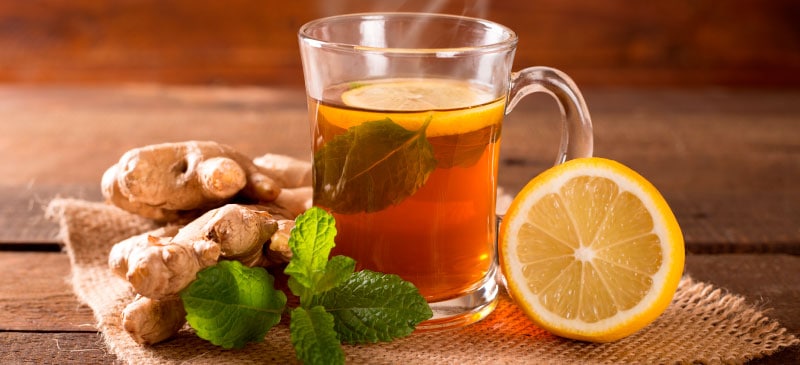
Fresh ginger tea and similar tonics have been used across the globe as natural remedies for symptoms like nausea for thousands of years due to the plant’s unique medicinal properties. Records show that the Ancient Chinese, Romans, Greeks and Arabs all relied upon ginger root in one way or another, at a time when anti-nausea and anti-inflammatory medications didn’t exist.
While it’s certainly possible to find dried ginger tea bags in most grocery stores, there’s nothing like fresh ginger tea for helping with digestion and other ailments.
If you’ve never made homemade herbal tea at home before, it might seem intimidating, but it’s in fact really easy to steep ginger in hot water in order to release its therapeutic compounds.
Why Is Ginger So Good for You?
However, only in recent years have we begun to uncover exactly why ginger is so good for you and the powerful effect that it can have on your health.
Research shows that ginger contains many valuable compounds, like gingerol, shogaol, paradol and zingerone. Gingerol, in particular, is considered to account for most of the beneficial effects of ginger.
Some studies have found that gingerol can even effectively inhibit inflammation. While inflammation is a perfectly normal immune response, chronic inflammation is thought to be at the root of conditions like cancer, diabetes and heart disease. Thanks to its gingerol content, ginger makes the list of top anti-inflammatory foods and has been used as a natural treatment for many inflammatory conditions, ranging from arthritis to Alzheimer’s.
Not only that, but ginger has also been found to be effective in fighting against pathogenic strains of viruses, fungi and bacteria that contribute to disease.
Studies continue to unearth the many ways that ginger affects health, and so far it has been shown to boast some impressive benefits. From relieving nausea to boosting brain health, enhancing weight loss and controlling blood sugar, a cup or two of ginger tea each day has the potential to make a big impact on your health. (You also may want to try to make ginger shots, which also feature other healthy ingredients.)
Benefits
1. Soothes the Stomach
Ginger has been used as a natural remedy for nausea, motion sickness and morning sickness for centuries. If you’re feeling a bit queasy, sipping on a hot cup of ginger root tea may be just what you need.
One study out of Thailand showed that ginger was able to decrease both nausea and vomiting in pregnant women. Plus, another study in 2012 out of the University of Rochester Medical Center even found that ginger reduced nausea severity caused by chemotherapy in adult cancer patients. To maximize the nausea-fighting potential, try adding some lemon or mint to your tea as well.
2. Enhances Immunity
Whether you’re starting to feel a bit under the weather or you have a full-blown case of the sniffles, ginger tea may be able to help give your immune system a much-needed boost. In fact, many people use ginger tea for cold symptoms, allergies and infections as an effective natural remedy.
Ginger contains compounds like gingerols, shogaol and paradols, which can help fight free radicals, reduce inflammation and reduce the risk of chronic disease, according to some test-tube studies.
Ginger root also features powerful antibacterial, antifungal and antiviral properties. Test-tube studies suggest that it may effectively protect against respiratory tract infections, fungal infections and even gum disease.
3. Protects Brain Health
Thanks to its ability to reduce inflammation, some research has found that ginger root benefits the health of your brain and could help protect against neurodegenerative disorders like Alzheimer’s disease or Parkinson’s.
A study published in Evidence-Based Complementary and Alternative Medicine showed that taking ginger extract for two months improved attention and cognitive function in middle-aged women. Similarly, a 2011 animal study found that ginger protected against brain damage and improved memory in rats.
4. Eases Pain
If you suffer from chronic pain in your joints or muscles, you may want to consider adding a cup of ginger tea into your routine. Ginger has been shown to alleviate inflammation, reduce muscle and joint pain, and even decrease the severity of menstrual cramps.
One study published in Arthritis and Rheumatism showed that ginger extract was able to significantly reduce knee pain caused by osteoarthritis. In the study, 261 patients with osteoarthritis of the knee were divided into a randomized, double-blind, placebo-controlled, multicenter, parallel-group, with one getting ginger extract and the other the control. After six weeks, “the percentage of responders experiencing a reduction in knee pain on standing was superior in the ginger extract group compared with the control group.”
Another study from Georgia College and State University’s Department of Kinesiology in 2010 found that ginger decreased exercise-induced muscle pain. Further research conducted by the Herbal Research Center at Shahed University in Iran also found that taking ginger root extract for five days significantly reduced menstrual pain severity compared to a placebo.
5. Increases Weight Loss
Looking to shed a few pounds? Try starting your day with a warm cup of ginger tea to kick up fat burning and help lose weight fast.
A 2017 review looked at 27 articles and found that ginger may be able to aid in weight loss by increasing fat breakdown, blocking fat absorption and suppressing appetite.
Another study published in the European Journal of Nutrition also found that hot tea consumption was associated with a lower waist circumference and decreased body mass index. These are just a couple ways ginger tea benefits weight loss.
6. Supports Digestive Health
Some studies have found that ginger can help promote proper digestion by preventing common conditions like indigestion and stomach ulcers, making it one of the best drinks for gut health.
One study out of Taiwan showed that taking ginger capsules improved gastric motility and actually doubled the speed of stomach emptying to help prevent dyspepsia, or indigestion. Meanwhile, an animal study in 2011 reported that ginger powder protected against the formation of aspirin-induced stomach ulcers in rats.
7. Promotes Blood Sugar Control
Diabetes is a growing health concern around the globe. In fact, according to a 2017 review published by Population Health Management, the prevalence of diabetes is expected to increase by 54 percent between 2015 and 2030.
Ginger tea may be beneficial when it comes to maintaining normal blood sugar levels. A study in Iran supplemented 22 participants with ginger daily and found that it led to decreased fasting blood sugar and better long-term blood sugar control.
Another study in 2014 showed that ginger powder improved blood sugar as well as insulin resistance in people with diabetes.
8. Keeps Cholesterol in Check
High cholesterol can build up in the blood, clogging blood vessels and increasing your risk of heart disease. Some studies have found that ginger may lower cholesterol levels to help protect the health of your heart.
An animal study conducted by the Department of Pharmacognosy and Medical Plants at Damascus University in Syria in 2013, for example, showed that ginger extract reduced total and bad LDL cholesterol with nearly the same effectiveness as a common medication used to lower cholesterol in rats.
Plus, another study published in the Saudi Medical Journal found that ginger significantly decreased triglycerides, total cholesterol and bad LDL cholesterol compared to a placebo.
9. Helps Manage Blood Pressure
Ginger is known to support heart health thanks in part to its ability to manage blood pressure levels. In fact, research on ginger supplementation revealed it has favorable effects on blood pressure levels.
A 2017 evaluation on the effects of daily ginger consumption on chronic disease found similar results. In the cross-sectional study, daily ginger consumption was associated with decreased risk for hypertension and coronary heart disease.
10. Displays Cancer-Fighting Abilities
Thanks in part to gingerol and its other beneficial compounds, ginger has displayed anti-cancer effects on several different types of cancer. For instance, ginger has shown promise in combating or helping with the symptoms of:
- colorectal cancer
- gastrointestinal cancer
- breast cancer
- pancreatic cancer
- leukemia
- ovarian cancer
- cervical cancer
- prostate cancer
- and more
How to Make Ginger Tea
Ginger tea is surprisingly easy to make. First, it’s important to use ginger root rather than ginger powder, as it contains more active and therapeutic compounds. Look for fresh ginger root that has a thin, shiny skin that can easily be scraped with your fingernail.
Simply wash about a two-inch knob of ginger root, and slice finely. No need to peel, but make sure all dirt is cleaned off.
Add ginger slices to around three cups of boiling water, and boil for 10 to 20 minutes, know that boiling it longer will make the tea even stronger.
Remove the pot from the stove, and strain the tea into a couple of mugs. Add fresh lemon juice from half a squeezed lemon along with one-fourth teaspoon of turmeric.
Optionally, add raw honey or maple syrup if you desire some sweetness. You can also add a pinch of cayenne pepper or a cinnamon stick for an extra kick.
Store any extra in the refrigerator for one to two days. Drink one to three cups daily to maximize the health benefits.
Depending on why you’re consuming fresh ginger tea, you may want to add other optional ingredients that support detoxification and your immune system. Here’s a bit about several “synergistic” ingredients that make great additions to fresh ginger tea:
- Turmeric — Provides the active compound called curcumin, which has demonstrated healthy inflammation support and antioxidant effects. May help improve digestive processes and is also considered a warming spice, supporting your metabolism. Also try our turmeric tea recipe.
- Lemon juice — Helps “trick” the liver into producing bile, which helps keep food moving through your body and gastrointestinal tract. May also help reduce indigestion and bloating.
- Raw honey — This is a nutrient-dense, natural sweetener that provides you with enzymes and antioxidants that have been shown to support immune function.
- Cayenne pepper — Contains the chemical called capsaicin, which has circulation-boosting abilities and the power to support digestion. It may help stimulate release of enzymes that can help curb an upset stomach, loss of appetite and cramps.
Nutrition Facts
In addition to providing us with powerful phytonutrients, ginger root also contains small amounts of potassium, copper, manganese, magnesium and vitamin C.
One serving of fresh ginger tea (about one cup) made using the recipe above with raw honey contains roughly the following:
- 40 calories
- nearly 0 grams protein, fiber and fat
- 8 grams sugar
- 9 grams carbohydrates
Curious about other ways to use ginger root once you’ve purchased it? It can be eaten fresh or ground, juiced or infused into your favorite beverages.
Try using it to make a homemade cough syrup with peppermint, or add a few tablespoons to a relaxing hot bath with lavender oil. You can also make ginger water or even ginger shots.
With it’s sharp, peppery flavor, you can also use it in stir-fries, smoothies, soups or vegetable juices for an extra bit of flavor and to increase the nutrient content.
Risks and Side Effects
Although uncommon, some people may have an allergy to ginger. If you experience any food allergy symptoms, such as hives, itching or swelling, after drinking ginger tea, discontinue use immediately, and talk to your doctor.
Additionally, ginger tea has been associated with mild side effects like heartburn, diarrhea and stomach pain. If you notice any of these symptoms, decrease consumption, and consult with a health care practitioner if you have any concerns.
For best results, it’s recommended to stick to one to three cups of ginger tea per day to maximize ginger tea benefits and minimize the risk of adverse side effects.
Final Thoughts
- Ginger contains gingerol, which is responsible for its antioxidant and anti-inflammatory effects — and therefore all the wonderful ginger tea benefits.
- Brewing your own ginger tea at home using fresh ginger is a simple way to take advantage of the many health benefits of ginger.
- Ginger tea benefits include reduced nausea, improved immunity, better brain and digestive health, lower cholesterol and blood sugar levels, pain relief, and increased weight loss.
- Use the ginger tea recipe below to make your own. Stick to one to three cups of ginger tea daily, and couple it with a nutritious diet and active lifestyle to enhance your health even more.
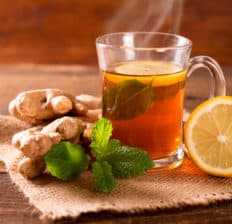
Ginger Tea Recipe
- Total Time: 22 minutes
- Yield: 2 1x
- Diet: Vegan
Description
If you’ve never made homemade herbal tea at home before, it might seem intimidating, but it’s in fact really easy to steep ginger in hot water in order to release its therapeutic compounds.
Ingredients
- 3 cups hot water
- one 2-inch knob of fresh ginger root
- fresh lemon juice from 1/2 of a lemon
- ¼ teaspoon turmeric
- 1 tablespoon raw honey or pure maple syrup (optional)
- pinch of cayenne pepper or a cinnamon stick (optional)
Instructions
- Wash a 2-inch knob of fresh ginger root and cut it into very thin slices. Peeling isn’t necessary, but you’ll want to scrub off any visible dirt.
- Add the ginger slices to hot water and boil for 10-20 minutes, depending on how strong you want it to be.
- Remove from the heat, strain by pouring the tea through a fine sieve to catch all of the ginger. Discard the ginger pieces and add in your choice of lemon, turmeric, raw honey/maple syrup or cayenne to enhance the flavor and beneficial effects. (If using turmeric root, cut it into thin slices and simmer with the ginger.)
- You can enjoy your fresh ginger tea either hot or cold based. Store any extra in the refrigerator for 1–2 days. Drink one to three cups daily to maximize the health benefits.
- Prep Time: 2 min
- Cook Time: 20 min
- Category: Beverages
- Method: Stovetop
- Cuisine: Chinese
Comments
Please keep comments under 200 characters.



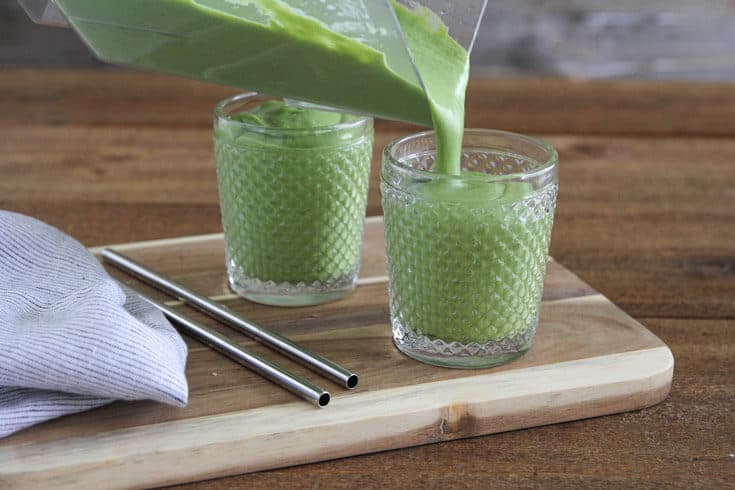
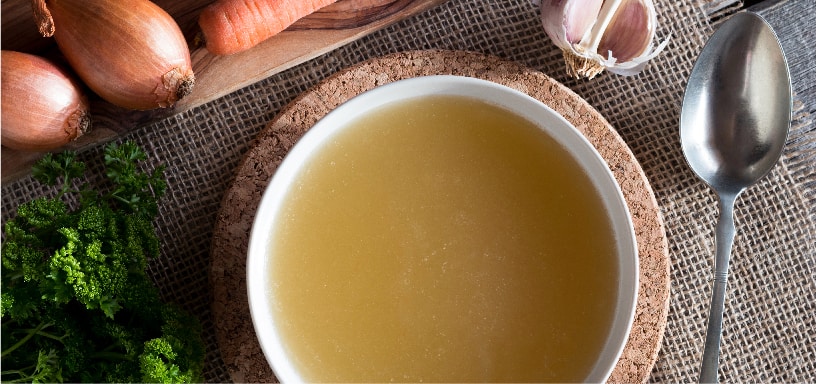
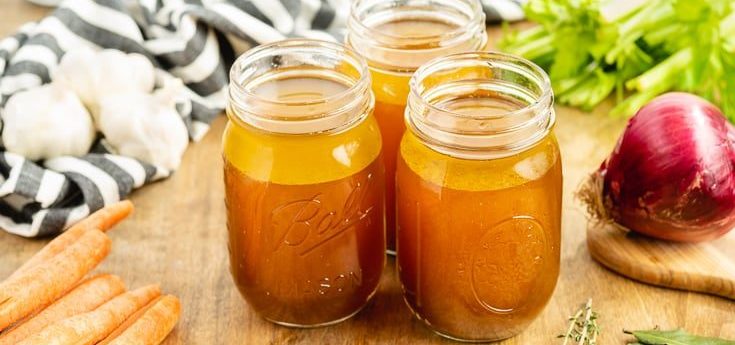
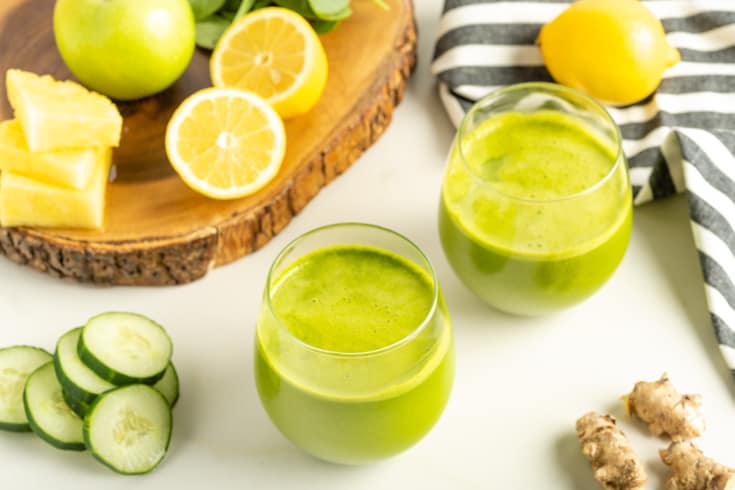

Hope to help my big toe from hurting
I do ginger root every day .and l do apple cider vinegar to every day . I have also do digestive enzymes every day to . And your new muscle collagen work so good . That the bottom of my feet has backing now and my feet stay warm on it own. I want to thank you for making it .
Awesome thanks so very much. My grandfather n grandmother taught me alot about the healing and health benefits of using herbs remedies . My grandfather’s ancestry was Aztec Indian
If using fresh tumeric, how much? A 2inch knob like the ginger?
This a good recipe. I like this tatse. Besides, do you know getaway shootout game? It’s an action game combined with pixel graphics.
Can’t wait to try this tonight!
Very informative article , thank you. I used ginger tea with honey and lemon juice when I had Covid. I just couldn’t tolerate the taste of plain water and found the tea to be very pleasant to drink and very soothing for my sore throat . I also enjoy it cold on a hot day with mint.
wonderful Article, covering all about Ginger. Very informative for common man. Great work done. Recipe of Ginger tea is very tasty.
Thank you Dr. Axe for all information you share.
Tell me, do natural diuretics lower potassium? I ask because I am retaining water in my leg and would like to use a natural diuretic instead of a prescribed one.
.
Alice, check out dandelion for your natural alternative for a diuretic which contains potassium to protect against potasium loss. I’m sure Dr Axe has a blog on that herb too.
I also put fresh ginger in blender then boil it in full pot of water. I drink a cup several times a day. read more
I love ginger tea.
Trying some Ginger Tea tonight, thanks for the info…
Ohhh I’m so thankful for this recipe! It helped my nausea & inflammation of gum disease, as well as boosting my immunesystem.
Thank you Dr. Axe
Miss Ange
Fantastic
I also put fresh ginger in blender then boil it in full pot of water. I drink a cup several times a day. Sweeten with honey.
Could I use dry ginger instead of the ginger root ?
This ginger tea recipe is a delightful and easy method to combat the common cold and stay well in the future. Ginger is also well-known for its therapeutic capabilities, which may be used to relieve and treat a range of diseases. This dish is ideal for anybody searching for a quick approach to treat a cold or anyone who wants to maintain their body healthy. you have enjoy your ginger tea in your shattered lives saga office. Two tablespoons fresh ginger, two teaspoons honey, and two cups water are used in the recipe. Heat the water in a saucepan until it boils. Stir in the ginger and honey and allow the mixture to boil for two minutes. Remove the kettle from the heat after two minutes and leave the tea to steep for another two minutes.
Just saw your comment, I use dry organic ginger powder all the time to make ginger tea, I put half a teaspoon in my cup, pour freshly boiled water on top then cover with a small plate. Leave for 10mins
Taste really good and quite strong, add more or less ginger for how strong you want it.
I add 1 teaspoon of glycine powder to sweeten mine, which also adds another dimension of health attributes to my body.
I am hardly ever get ill.